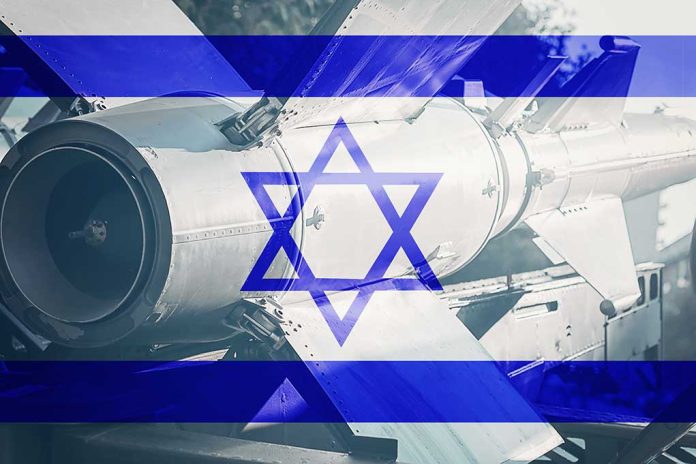
IRGC Chief Hossein Salami was killed in a massive Israeli airstrike operation that targeted multiple Iranian military leaders and nuclear sites, marking a dramatic escalation in the Middle East conflict.
Key Takeaways
- Iran’s Revolutionary Guards Commander Hossein Salami and IRGC Major General Gholam Ali Rashid were killed in Israeli strikes that involved dozens of aircraft targeting military and nuclear sites.
- Several Iranian nuclear scientists and academics were also reportedly assassinated, including Dr. Fereydoun Abbasi and his family.
- Israeli Defense Minister Israel Katz declared a “special state of emergency” following the preemptive strike, while the U.S. has denied involvement in the operation.
- The operation, dubbed “Rising Lion,” appears to target Iran’s nuclear capabilities, with the IDF stating it aims to prevent Iran from obtaining nuclear weapons.
- Iranian state media claims civilian casualties, including children, though these reports remain unverified as the situation continues to develop.
Israel Launches Massive Strike Against Iranian Leadership
Israeli forces executed a coordinated attack against Iranian military and nuclear targets early Friday morning, resulting in the reported deaths of several high-ranking Iranian officials. Iranian state media confirmed that Revolutionary Guards Commander Hossein Salami was killed in the opening salvo of Israel’s Operation Rising Lion. This strategic strike represents a significant escalation in tensions between the two nations, as Salami was the top military figure in Iran’s Islamic Revolutionary Guard Corps, an organization that has long been at odds with Israeli security interests.
“Iranian state media confirmed the killing of Iran’s Revolutionary Guards Commander Hossein Salami in the opening strike of Israel’s Operation Rising Lion, early Friday morning,” reported Yonah Jeremy Bob and Jerusalem Post Staff from The Jerusalem Post.
In addition to Salami, IRGC Major General Gholam Ali Rashid was also reported killed in the attack. The operation wasn’t limited to military leadership targets – several prominent nuclear scientists were also reportedly assassinated, including Dr. Fereydoun Abbasi along with his wife and child. Academic figures Dr. Abdulhamid Minouchehr, a dean at Shahid Beheshti University, and professor Ahmadreza Zolfaghari were also reportedly killed, suggesting Israel’s operation aimed to cripple both Iran’s military command structure and its nuclear expertise.
🚨🇮🇱🇮🇷 BREAKING: TOP IRGC COMMANDERS, NUCLEAR CHIEF KILLED IN ISRAELI STRIKES ON TEHRAN
Iranian state media reports that IRGC Commander-in-Chief Hossein Salami, former Atomic Energy chief Fereydoon Abbasi-Davani, and Khatam-al Anbiya Central HQ Commander Major General Gholam Ali… https://t.co/2U6IcgAGAT pic.twitter.com/Vf2IIkvglC
— Mario Nawfal (@MarioNawfal) June 13, 2025
U.S. Distances Itself From Israeli Operation
As the situation continues to unfold, U.S. Secretary of State Marco Rubio made it clear that America was not involved in the strikes against Iran. “Tonight, Israel took unilateral action against Iran. We are not involved in strikes against Iran and our top priority is protecting American forces in the region,” stated Secretary Rubio, emphasizing America’s focus on protecting its own personnel while acknowledging Israel’s right to self-defense against Iranian threats that have been mounting for months.
“Israel advised us that they believe this action was necessary for its self-defense. President Trump and the Administration have taken all necessary steps to protect our forces and remain in close contact with our regional partners. Let me be clear: Iran should not target U.S. interests or personnel,” said U.S. Secretary of State Marco Rubio from Newsweek.
Israeli Defense Minister Israel Katz declared a “special state of emergency” in Israel following the strike, indicating the seriousness with which Israel views the possibility of Iranian retaliation. Meanwhile, the U.S. Embassy in Baghdad was reportedly preparing for evacuation of non-essential personnel due to heightened security threats in the region. These precautionary measures underscore the potential for wider regional conflict as tensions between Israel and Iran reach new heights.
Operation Rising Lion Targets Nuclear Capabilities
The Israeli strikes, part of what has been dubbed “Operation Rising Lion,” specifically targeted Iranian nuclear facilities and military sites. According to reports, dozens of Israeli aircraft participated in the initial wave of strikes against multiple targets. The Israel Defense Forces stated that the operation aimed to prevent Iran from obtaining nuclear weapons, a longstanding concern for Israel and its allies. This mission appears to be a preemptive effort to degrade Iran’s nuclear capabilities before they reach a point of no return.
“Dozens of Israeli aircraft participated in an initial wave of strikes on dozens of military targets and Iranian nuclear sites early on Friday morning,” reported Yonah Jeremy Bob and Jerusalem Post Staff from The Jerusalem Post.
Iranian state media has claimed that civilians, including children, were killed in the strikes, though these reports have not been independently verified. Local news agencies Tasnim and Mehr both reported on Salami’s death, referring to him as “martyred.” The elimination of such a high-profile figure represents one of the most significant blows to Iran’s military leadership in recent years. As of now, it remains unclear how or when Iran will respond to these strikes, though regional observers anticipate some form of retaliation.
Regional Implications and Next Steps
The assassination of Iran’s Revolutionary Guard chief marks a significant turning point in Middle East tensions. With Iran already warning of potential attacks on U.S. bases if nuclear talks fail, this strike could accelerate regional instability. President Trump has emphasized a commitment to diplomatic resolution of the Iran nuclear issue, but Israel’s unilateral action demonstrates its unwillingness to wait for diplomatic channels when facing what it perceives as an existential threat.
As the situation develops, U.S. Senators have expressed concerns about potential conflict with Iran and its wider implications. The coming days will be critical in determining whether this operation leads to a broader regional war or remains a limited strike against specific Iranian capabilities. What’s certain is that the killing of Major General Hossein Salami has dramatically altered the strategic landscape in the Middle East, with consequences that will likely reverberate throughout the region for months to come.




